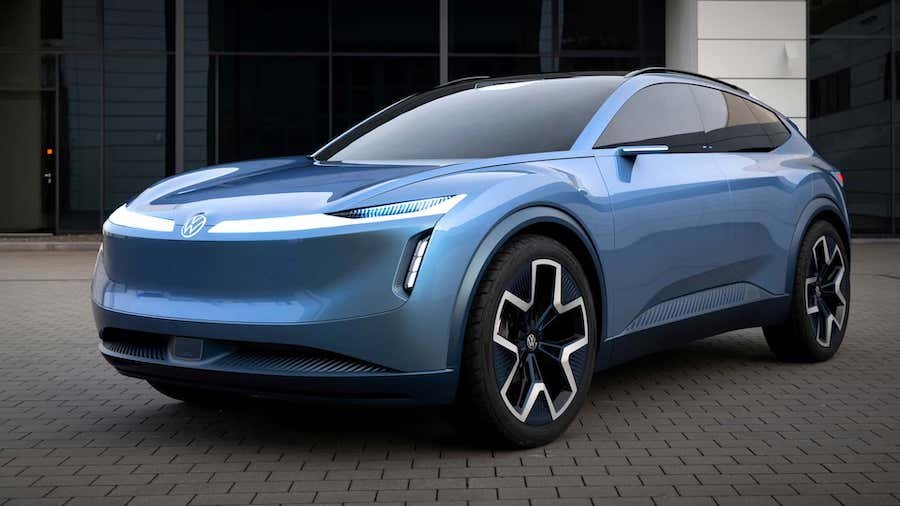Volkswagen rethinks EVs in China with bold ID Code concept

Volkswagen has revealed a radical shift in design for its future electric models with the unveiling of the ID Code concept at the 2024 Beijing motor show.
Sporting a sleek new design language conceived exclusively for Chinese-market cars, the SUV-coupé concept previews a new range of electric models being developed in partnership with Volkswagen's various joint venture partners in China, says Volkswagen CEO Thomas Schäfer.
Based on an unspecified platform architecture that is claimed to accommodate both single-motor rear-wheel drive and dual-motor four-wheel drive – as well as varying battery capacities and ranges – the ID Code itself will evolve into a new flagship model to top Volkswagen's newly announced ID UX Chinese EV family.
Departing dramatically in look and packaging from today's ID-badged models, the new four-seater adopts a distinctive front end with flamboyant headlight styling and an illuminated Volkswagen logo - features that, Volkswagen says, resonate well with younger EV buyers in China.
Volkswagen design boss Andreas Mindt described the ID Code as "distinguished" and "inspiring". He said: "It's thoroughly contemporary and more expressive than any of our existing models."
The former Bentley design boss said efforts have been made to provide the new concept with human-like qualities through light animations, including a welcome function for the headlights that mimic the blinking of eyes.
"We wanted to give the ID Code a warm human-like touch. It should provide visual attachment the moment you see it. It is not robotic and cold," he told Autocar.
The light animations are conceived to be altered every three months to freshen the look of the car via over-the-air software updates on a subscription basis.
The clean, low front end features an undercut design without a traditional grille, which progresses into a long bonnet, raked windscreen and a curved roofline, giving the new Volkswagen concept more traditional proportions than existing, cab-forward ID models. This is further accentuated by a high waistline and a relatively shallow glasshouse.
Other distinguishing elements include prominent front wheel arches and rear haunches above large wheelhouses all round. An extended wheelbase also helps to shorten the overhangs, while wide tracks provide a muscular stance and should boost stability on the move.
As part of Volkswagen's efforts to match its Chinese rivals on digital functionality, an avatar appears on the driver's side window when you approach with the key, providing information on the traffic and weather conditions, as part of what Volkswagen calls its Smart Window Concept.
The ID Code has a heavily angled back window and horizontal brake lights that mirror the headlights, all hosted in a shooting brake-style tailgate and decorated with an illuminated logo.
There is heavy tapering to the corners, backing up Mindt's claims that the new concept has been developed as much for style as outright space.
Along with its progressive exterior styling, the 4800mm-long concept also previews a new driver-centric interior design, based around AI-supported infotainment functions and advanced level-four autonomous driving capability - the latter function signalled by lidar units that light up the exterior of the car when it’s driving itself.
Created to support a diverse range of electric lifestyle-oriented models, the ID UX electric car sub-brand is intended to appeal to a younger audience than Volkswagen's existing range of ID models.
"The ID Code gives the first glimpse of the future of Volkswagen in China," said Schäfer. "It is part of a sharpened brand experience aimed at tapping into new customer groups in China."
The ideas, technology and processes behind the new concept have been developed to bring future Volkswagen models into closer competition with those from both established Chinese car makers and newer electric car start-ups such as Nio, Xpeng, Aito and Li Auto.
Although the new design language has been conceived for models to be sold in China, insiders at Volkswagen's design headquarters in Wolfsburg, Germany, say discussions are already under way as to how it may influence future models planned for sale in Europe.
"We've shown how we will progress the look of electric models for Europe with the ID 2 and ID 2 GTI. They're more traditional in terms of styling," said Mindt. "However, we are not ruling out a car like the ID Code being introduced to other markets in the future. For now, though, it is only planned for China."
The first model in the ID UX line-up is the ID Unyx - a rebadged version of the Cupra Tavascan produced at a joint-venture factory operated in partnership with JAC in the Chinese city of Hefei.
An extension of the existing ID line-up conceived exclusively for the Chinese market, it forms an integral part of Volkswagen's 'In China, for China' strategy.
At the unveiling of the ID Code, Volkswagen revealed the ID line-up will grow to a total of 16 models by 2030, including five models from the ID UX range.
Despite the heavy focus on its electric car offerings, however, the German car maker says it remains committed to combustion vehicles, with plans to expand its line-up in China with 12 new petrol models and six new plug-in-hybrids - the latter all offering an electric range of more than 62 miles.
In addition to models based on its existing MQB (ICE) and MEB (EV) platforms, it plans to launch new models on the EE electric car platform being developed in partnership with Xpeng as well as a new electric car platform that goes under the name China Main Platform (CMP) from 2026.
Volkswagen has also teamed with Horizon Robotics and Thundersoft in China for the development of autonomous driving, infotainment and connectivity features.
Verwandte Nachrichten
